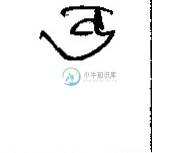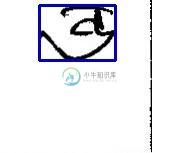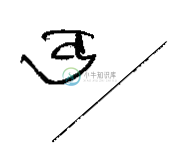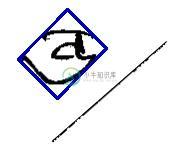如何使用python opencv裁剪图像中最大的对象?
我想裁剪图像中最大的对象(字符)。此代码仅在没有行的情况下才有效(如第一幅图像所示)。但是我需要忽略这条线并制作第二张图像。仅裁剪最大的对象图像。
import cv2
x1, y1, w1, h1 = (0,0,0,0)
points = 0
# load image
img = cv2.imread('Image.jpg')
gray = cv2.cvtColor(img, cv2.COLOR_BGR2GRAY) # convert to grayscale
# threshold to get just the signature
retval, thresh_gray = cv2.threshold(gray, thresh=100, maxval=255, type=cv2.THRESH_BINARY)
# find where the signature is and make a cropped region
points = np.argwhere(thresh_gray==0) # find where the black pixels are
points = np.fliplr(points) # store them in x,y coordinates instead of row,col indices
x, y, w, h = cv2.boundingRect(points) # create a rectangle around those points
crop = img[y:y+h, x:x+w]
cv2.imshow('save.jpg', crop)
cv2.waitkey(0)
输入值
输出:

问题答案:
您可以使用functionfindContours来做到这一点。
例如,像这样:
#!/usr/bin/env python
import cv2
import numpy as np
# load image
img = cv2.imread('Image.jpg')
gray = cv2.cvtColor(img, cv2.COLOR_BGR2GRAY) # convert to grayscale
# threshold to get just the signature (INVERTED)
retval, thresh_gray = cv2.threshold(gray, thresh=100, maxval=255, \
type=cv2.THRESH_BINARY_INV)
image, contours, hierarchy = cv2.findContours(thresh_gray,cv2.RETR_LIST, \
cv2.CHAIN_APPROX_SIMPLE)
# Find object with the biggest bounding box
mx = (0,0,0,0) # biggest bounding box so far
mx_area = 0
for cont in contours:
x,y,w,h = cv2.boundingRect(cont)
area = w*h
if area > mx_area:
mx = x,y,w,h
mx_area = area
x,y,w,h = mx
# Output to files
roi=img[y:y+h,x:x+w]
cv2.imwrite('Image_crop.jpg', roi)
cv2.rectangle(img,(x,y),(x+w,y+h),(200,0,0),2)
cv2.imwrite('Image_cont.jpg', img)
请注意,我使用THRESH_BINARY_INV代替THRESH_BINARY。
Image_cont.jpg:

图片_crop.jpg:

您也可以将其与@Jello指出的倾斜矩形一起使用。与上述更简单的解决方案不同,这将正确滤除对角线。
例如:
#!/usr/bin/env python
import cv2
import numpy as np
# load image
img = cv2.imread('Image2.png')
gray = cv2.cvtColor(img, cv2.COLOR_BGR2GRAY) # convert to grayscale
# threshold to get just the signature (INVERTED)
retval, thresh_gray = cv2.threshold(gray, 100, maxval=255, \
type=cv2.THRESH_BINARY_INV)
image, contours, hierarchy = cv2.findContours(thresh_gray,cv2.RETR_LIST, \
cv2.CHAIN_APPROX_SIMPLE)
def crop_minAreaRect(img, rect):
# Source: https://stackoverflow.com/questions/37177811/
# rotate img
angle = rect[2]
rows,cols = img.shape[0], img.shape[1]
matrix = cv2.getRotationMatrix2D((cols/2,rows/2),angle,1)
img_rot = cv2.warpAffine(img,matrix,(cols,rows))
# rotate bounding box
rect0 = (rect[0], rect[1], 0.0)
box = cv2.boxPoints(rect)
pts = np.int0(cv2.transform(np.array([box]), matrix))[0]
pts[pts < 0] = 0
# crop and return
return img_rot[pts[1][1]:pts[0][1], pts[1][0]:pts[2][0]]
# Find object with the biggest bounding box
mx_rect = (0,0,0,0) # biggest skewed bounding box
mx_area = 0
for cont in contours:
arect = cv2.minAreaRect(cont)
area = arect[1][0]*arect[1][1]
if area > mx_area:
mx_rect, mx_area = arect, area
# Output to files
roi = crop_minAreaRect(img, mx_rect)
cv2.imwrite('Image_crop.jpg', roi)
box = cv2.boxPoints(mx_rect)
box = np.int0(box)
cv2.drawContours(img,[box],0,(200,0,0),2)
cv2.imwrite('Image_cont.jpg', img)
Image2.png(输入图像):

Image_cont.jpg:

图片_crop.jpg:

如果您使用opencv-python 4.x,请更改image, contours, hierarchy为just contours, hierarchy。
-
我想裁剪图像中最大的对象(字符)。此代码仅在没有线条的情况下有效(如第一幅图所示)。但我需要忽略线,使第二个图像的形象。仅裁剪最大的对象图像。
-
问题内容: 我如何像以前在PIL中一样使用OpenCV裁剪图像。 PIL的工作示例 但是我如何在上做到这一点? 这是我尝试的: 但这是行不通的。 我认为我使用不正确。如果是这种情况,请说明如何正确使用此功能。 问题答案: 非常简单。使用numpy切片。
-
我试图在从图库中选择图像后使用intent来裁剪图像。以下是我的代码片段 在这里,我使用PICK_IMAGE_REQUEST意图句柄调用上面的代码段 由于我在裁剪后使用了相同的意图,即PICK_IMAGE_REQUEST,可能会出现什么问题
-
问题内容: 下面的代码可以很好地裁剪图像,这是我想要的,但是对于较大的图像,它也可以正常工作。有什么办法可以缩小图像吗? 想法是,在裁剪之前,我将能够使每个图像的大小大致相同,以便每次都能获得良好的效果 代码是 问题答案: 如果要生成缩略图,则必须首先使用调整图像大小。您必须调整图像的大小,以使图像较小侧的尺寸等于拇指的相应侧。 例如,如果源图像为1280x800px,拇指为200x150px,则
-
本文向大家介绍在Python中使用OpenCV裁剪图像,包括了在Python中使用OpenCV裁剪图像的使用技巧和注意事项,需要的朋友参考一下 什么是裁剪? 裁剪是从摄影或插图图像中去除不需要的外部区域。该过程通常包括去除图像的某些外围区域,以从图片中去除多余的垃圾,改善其取景,改变纵横比,或使主题与背景突出或分离。 我们将使用 OpenCV-python (cv2)的这些函数, imread()
-
我将<code>背景 1.back_xml: 2.瓷砖.xml 现在,我将back.xml设置为< code >背景以< code>LinearLayout工作正常。 我需要有一个圆角,以及它的边框。但是我只有圆角的边框,而不是图像,我的代码中有什么问题吗? 这是我的照片:
-
本节,我们将裁剪图像的一部分,然后把其结果绘制到画布上。 图3-2 裁剪图像 绘制步骤 按照以下步骤,裁剪图像的一部分,再把结果绘制到画布: 1. 定义画布上下文: window.onload = function(){ var canvas = document.getElementById("myCanvas"); var context = canvas.getContext
-
问题内容: 我有这个HTML: 使用此CSS: 我正在应用的背景图像是200x100像素,但我只想显示200x50像素的背景图像的裁剪部分。 似乎不是正确的CSS属性。我该怎么用呢? 不应使用,因为我在Sprite上下文中使用了上述CSS,在该Sprite上下文中,我要显示的图像部分小于定义CSS的元素。 问题答案: 您可以将图形放置在具有其自身尺寸上下文的伪元素中: 浏览器支持很好,但是如果需要

